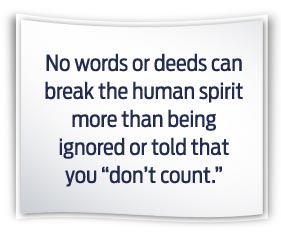
“O little town of Bethlehem, how still we see thee lie . . .
The hopes and fears of all the years are met in thee tonight.”
When Phillips Brooks wrote these lines in 1868, he acknowledged that Jesus’ birth in Bethlehem was part of the great battle between Satan and God. The hopes and fears that met in Bethlehem that holy night tell us that Christmas is not just about a babe born in a manger—it’s about a battle of cosmic proportions.
That ancient battle of Bethlehem focuses immediate attention on the city of David, but if we look beneath the surface of the inspired words of Matthew and Luke, we see that the conflict is directly linked to every city and community in the world.
Every year we are reminded that this great conflict between hope and fear rages in the hearts and homes of people everywhere. During these days, more than at any other time, people decide they’ve had enough strife in their lives and break up, crack up, or hang up in defeat. Some end their lives tragically, refusing to be sedated any longer by commercially manufactured joy, peace, and excitement.
 Christians also find ways to disguise their despair and numb their pain. Most of us do things in extreme measures during this season to mask or conceal the truth about the conflict between hopes and fears that flares out of control in our hearts. Perhaps we’d rather wrestle with flesh and blood than submit to the lordship of the Hero of this cosmic controversy.
Christians also find ways to disguise their despair and numb their pain. Most of us do things in extreme measures during this season to mask or conceal the truth about the conflict between hopes and fears that flares out of control in our hearts. Perhaps we’d rather wrestle with flesh and blood than submit to the lordship of the Hero of this cosmic controversy.
Images of hope and fear are arrayed in the story of the birth of Jesus.
First, people were ordered to go to Bethlehem to be counted according to the Roman decree. This was good news for normally neglected peasants. No words or deeds can break the human spirit more than being ignored or told that you “don’t count.”
Mary and Joseph’s hopes ranged from great expectations to small wonders about the anticipated advent of the Child, described by the angel as the Son of God. Their fears were so palpable that the angel had to repeatedly command them to stop being afraid. Mary feared that her life, already turned upside down by being chosen, would never again be normal because of the child growing and kicking in her womb. She would face either blessing for His miraculous role, or reproach and humiliation because of the mystery of His birth.
The shepherds were social and religious outcasts: vulgar, dirty, smelly, unkempt men apparently isolated by their profession from both man and God. They were considered defiled and unfit to participate in Temple ceremonies. They remind us of sinners separated from God and desperately in need of salvation. They didn’t count on earth, but some doubtless cherished the hope they’d be accounted worthy in heaven.
The appearance of the Magi represents the aliens and foreigners who seek Jesus. Following a star from the East, they believed it announced the arrival of the Messiah. Their desire to see Him motivated them to travel for months to fulfill their hopes of worshipping the King of kings. But their hope turned to fear when they lost track of the star and ended up in the hands of Herod.
The paranoia of King Herod cannot be ignored. He hoped to steadfastly maintain the security of his power and position by any means, including the murder of one wife and several of his sons. When the Magi arrived in Jerusalem, Herod was afraid he’d be deposed, upstaged, displaced! So he decided to nip the threat in the bud by murdering the Messiah. His actions demonstrated that he was being manipulated like a puppet by the power of Satan in the battle of Bethlehem.
The people in Bethlehem—indeed, the entire human race—desperately needed a hero. But He came as a baby!
What was God thinking when He sent a helpless baby into the battle of Bethlehem? The babe brought peace on earth and goodwill to those in whom He was pleased. He put into operation a ceasefire, not just between our hopes and fears, but between divinity and humanity.
That’s why His name is still Wonderful, Counselor, Mighty God, and Prince of Peace!
____________
Hyveth Williams is a professor of homiletics at the Seventh-day Adventist Theological Seminary in Berrien Springs, Michigan. This article was published on December 15, 2011.